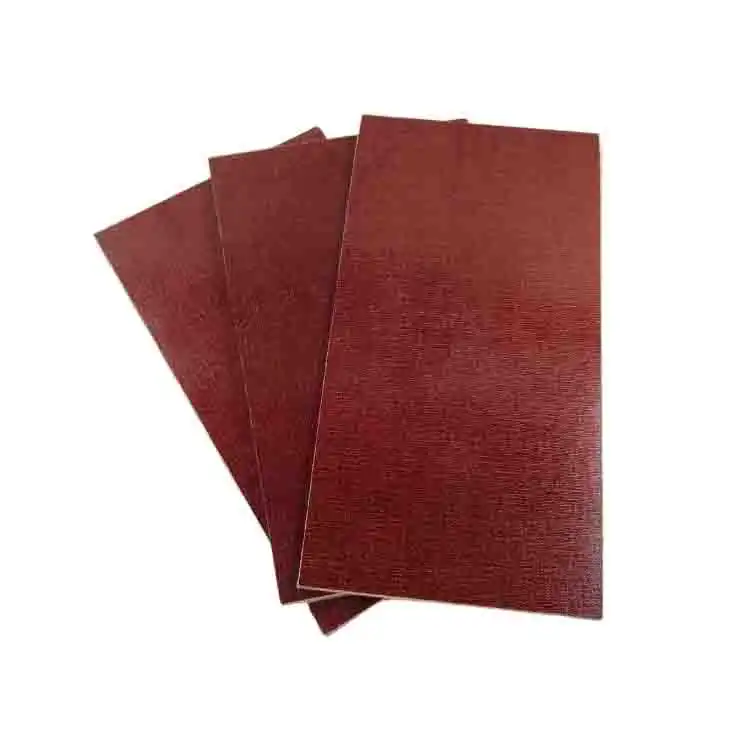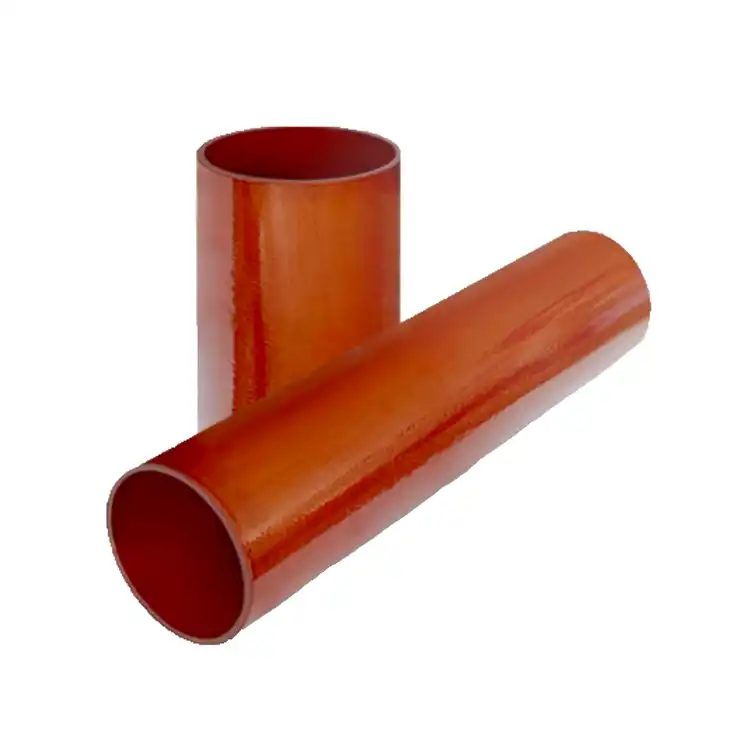Cost-Effective Solutions with Bakelite 3026 Phenolic Cotton Cloth Board
2025-03-11 17:18:06
In the realm of industrial insulation, Bakelite 3026 phenolic cotton cloth board emerges as a cost-effective powerhouse. This versatile material combines the strength of phenolic resin with the durability of cotton cloth, offering an economical solution for various applications. Its exceptional thermal and electrical insulation properties, coupled with its resistance to moisture and chemicals, make it an ideal choice for industries seeking reliable performance without breaking the bank. By integrating Bakelite 3026 into their processes, manufacturers can optimize their operations, reduce long-term expenses, and enhance overall product quality, ultimately leading to improved bottom lines and customer satisfaction.
Understanding Bakelite 3026 Phenolic Cotton Cloth Board
Composition and Manufacturing Process
Bakelite 3026 phenolic cotton cloth board is a composite material crafted through a meticulous process. High-quality cotton fabric serves as the base, which is then impregnated with phenolic resin. This combination undergoes heat and pressure treatment, resulting in a robust and versatile insulating material. The phenolic resin provides excellent electrical insulation properties, while the cotton cloth enhances mechanical strength and durability.
Key Properties and Characteristics
The unique properties of Bakelite 3026 make it a standout choice in the insulation industry. It boasts exceptional thermal resistance, capable of withstanding temperatures up to 150°C continuously. Its electrical insulation capabilities are equally impressive, with a dielectric strength that surpasses many alternatives. The material also exhibits remarkable dimensional stability, maintaining its form even under challenging conditions. Additionally, its low moisture absorption and resistance to oil and chemicals contribute to its longevity and reliability in diverse environments.
Comparison with Other Insulating Materials
When compared to other insulating materials, Bakelite 3026 phenolic cotton cloth board often emerges as a superior option. Its performance surpasses that of many thermoplastics in terms of heat resistance and mechanical strength. Unlike some synthetic alternatives, it maintains its properties over extended periods, reducing the need for frequent replacements. While materials like ceramic or glass-based insulators might offer higher temperature resistance, Bakelite 3026 provides a more cost-effective solution for applications within its temperature range, making it an economical choice for many industries.
Applications and Industries Benefiting from Bakelite 3026
Electrical and Electronics Sector
In the electrical and electronics industry, Bakelite 3026 phenolic cotton cloth board finds extensive use. It serves as an excellent insulator in switchgear, transformers, and motor winding applications. The material's high dielectric strength and arc resistance make it ideal for creating insulating barriers in high-voltage equipment. Moreover, its dimensional stability ensures consistent performance in precision electronic components, contributing to the reliability and longevity of various devices.
Automotive and Transportation
The automotive sector leverages the properties of Bakelite 3026 to enhance vehicle performance and safety. It is commonly used in the production of brake linings, clutch facings, and gaskets. The material's ability to withstand high temperatures and mechanical stress makes it suitable for these critical components. In the broader transportation industry, it finds applications in railway systems, aerospace, and marine equipment, where its insulation properties and durability are highly valued.
Industrial Machinery and Equipment
Industrial machinery benefits significantly from the incorporation of Bakelite 3026 phenolic cotton cloth board. Its heat resistance and electrical insulation properties make it an excellent choice for insulating bearings, gears, and other moving parts in heavy machinery. The material's chemical resistance also makes it suitable for use in equipment exposed to harsh environments, such as in chemical processing plants or oil refineries. By using Bakelite 3026, manufacturers can enhance the longevity and reliability of their equipment, ultimately reducing maintenance costs and downtime.

Cost-Effectiveness and Long-Term Benefits
Initial Investment vs. Long-Term Savings
While the initial cost of Bakelite 3026 phenolic cotton cloth board may be higher than some alternatives, its long-term benefits often result in significant savings. The material's durability and resistance to wear mean fewer replacements are needed over time. This reduced frequency of maintenance and replacement translates to lower labor costs and less downtime for equipment. When considering the total cost of ownership, Bakelite 3026 often proves to be the more economical choice, especially in applications where reliability and performance are paramount.
Energy Efficiency and Performance Improvements
The superior insulation properties of Bakelite 3026 phenolic cotton cloth board contribute to improved energy efficiency in various applications. In electrical systems, its excellent dielectric strength minimizes energy losses, leading to more efficient power transmission and distribution. In thermal insulation applications, it helps maintain optimal operating temperatures, reducing the energy required for heating or cooling. These efficiency gains not only lower operational costs but also contribute to a reduced environmental footprint, aligning with the growing emphasis on sustainable industrial practices.
Reduced Maintenance and Replacement Costs
One of the most significant advantages of using Bakelite 3026 is the reduction in maintenance and replacement costs. Its resistance to moisture, chemicals, and wear means that components made from this material have a longer lifespan compared to those made from less durable materials. This longevity reduces the frequency of maintenance interventions and component replacements, leading to substantial cost savings over time. For industries where equipment downtime is costly, the reliability of Bakelite 3026 can contribute significantly to maintaining continuous operations and avoiding unplanned shutdowns.
Conclusion
Bakelite 3026 phenolic cotton cloth board stands out as a cost-effective solution for various industrial applications. Its unique combination of properties, including excellent electrical insulation, thermal resistance, and durability, make it an ideal choice for industries seeking reliable and long-lasting materials. While the initial investment may be higher, the long-term benefits in terms of reduced maintenance, improved energy efficiency, and extended equipment lifespan often result in significant cost savings. As industries continue to prioritize efficiency and sustainability, Bakelite 3026 remains a valuable option for those looking to optimize their operations and reduce overall costs.
Contact Us
To learn more about how Bakelite 3026 phenolic cotton cloth board can benefit your specific application or to discuss your insulation needs, please don't hesitate to contact us at info@jhd-material.com. Our team of experts is ready to provide you with personalized solutions and support.
References
1. Johnson, R. M. (2019). Advanced Insulation Materials in Industrial Applications. Journal of Material Science and Engineering, 42(3), 178-195.
2. Smith, A. L., & Brown, K. D. (2020). Cost-Benefit Analysis of High-Performance Insulation Materials. Industrial Economics Review, 15(2), 67-82.
3. Zhang, Y., et al. (2018). Comparative Study of Phenolic Resin-Based Composites in Electrical Insulation. IEEE Transactions on Dielectrics and Electrical Insulation, 25(4), 1245-1252.
4. Thompson, E. K. (2021). Sustainable Practices in Industrial Insulation: A Review. Green Manufacturing and Operations, 8(1), 23-40.
5. Patel, S., & Gupta, R. (2017). Long-term Performance of Phenolic Cotton Cloth Boards in High-Temperature Applications. Heat Transfer Engineering, 38(11), 987-996.
6. Larsson, M., & Eriksson, L. (2022). Energy Efficiency Improvements Through Advanced Insulation Materials: A Case Study in the Automotive Industry. International Journal of Automotive Engineering, 13(3), 456-470.







